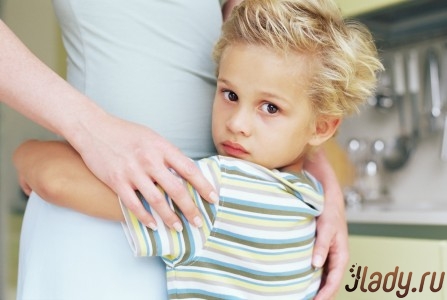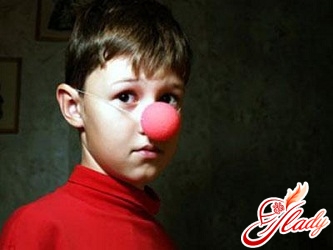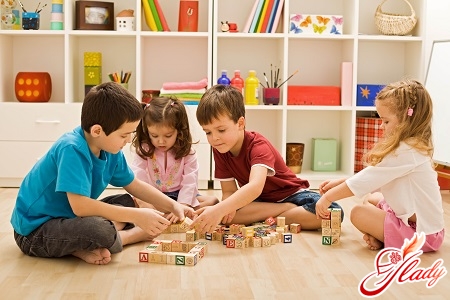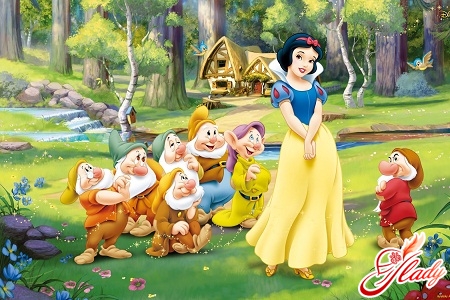 We are all afraid of something and are sure that our fearsare fully justified. But when the child pales at the sight of a clown, sobs at a routine examination with a doctor, clings to your hand when you meet a dog peacefully walking on a leash, it's hard for us to understand why he is so scared. Perhaps you are one of those lucky people who boldly sits in the chair of the dentist, without a hitch, donating blood and nothing against regular physical examinations. But when it came time for your baby to visit the dentist, he began to sob and squirm, trying to get out of the "terrible" chair. Where did this fear come from? And how to behave in a similar situation: scold a coward for lack of courage, go into lengthy explanations of the painlessness of such procedures or postpone a visit to the dental for an indefinite period? The child's fears, which can be perceived as annoying hindrances, are in fact part of his development and adaptation. As they mature, they mutate, reflecting the changes that are taking place in his life. The baby begins to crawl, learns to walk, talk, every day brings a new life. Everything happens so fast! And a small child needs to cope with all the changes in mental and physical development, simultaneously absorbing a lot of information. But some situations turn out to be too complex for him, and then he can experience anxiety and fear. But you are close and can always cheer and comfort him.
We are all afraid of something and are sure that our fearsare fully justified. But when the child pales at the sight of a clown, sobs at a routine examination with a doctor, clings to your hand when you meet a dog peacefully walking on a leash, it's hard for us to understand why he is so scared. Perhaps you are one of those lucky people who boldly sits in the chair of the dentist, without a hitch, donating blood and nothing against regular physical examinations. But when it came time for your baby to visit the dentist, he began to sob and squirm, trying to get out of the "terrible" chair. Where did this fear come from? And how to behave in a similar situation: scold a coward for lack of courage, go into lengthy explanations of the painlessness of such procedures or postpone a visit to the dental for an indefinite period? The child's fears, which can be perceived as annoying hindrances, are in fact part of his development and adaptation. As they mature, they mutate, reflecting the changes that are taking place in his life. The baby begins to crawl, learns to walk, talk, every day brings a new life. Everything happens so fast! And a small child needs to cope with all the changes in mental and physical development, simultaneously absorbing a lot of information. But some situations turn out to be too complex for him, and then he can experience anxiety and fear. But you are close and can always cheer and comfort him.
Monsters (from 3 to 6 years)
Why do children fear monsters? For a small child, reality and fantasy exist in the same space. In his ideas there is as yet no clear boundary dividing these two worlds. Monsters can lie in wait for him behind the cupboard or under the bed, but disappear as soon as you go into the room or turn on the night light. At the moment when the child moves to his room or from a cot to a "big one", he can be seized with an acute sense of loneliness and abandonment. He has a fear of growing up and the need to be independent, but he can not realize it and put it into words. To show fear, it is necessary for him to find a form, an object, and this form is most often monsters, ghosts, villains from fairy tales or cartoons. These horror stories help the child show you that something is bothering him, that he is afraid. How to help? Do not discount the fears of the baby with phrases like: "It's all fiction!" Or "Do not be silly!" Do not shame him, do not call him a coward: he will not fear less, but he will learn to hide his feelings so as not to be ridiculed. Yes, there is no one under the bed, but he feels real feelings. It is not necessary and to assure him that the monster has already left: so you will not reassure your crumb, but only strengthen fears. In the end, if the terrible creature disappeared, then it still existed! Try to understand what is really bothering the child, and ask him what could help him be less afraid. Perhaps he will ask you to sit with him, or leave the night light on, or give his favorite toy. Tell him that he seems to be really scared now, but his fear will gradually pass, and you will help him in this. So the child will feel that, despite the changes in his life, he is still connected with you by strong bonds.
Doctors (from 1 year to 7 years)
Why do children fear doctors? Sitting in an armchair at the dentist or sensing the chills of a stethoscope, the child feels vulnerable. He does not know what they are going to do with him. Other people's hands are touching his body, and this is experienced as an invasion of personal space. Yes, and medical instruments look frightening. Most doctors are afraid of children who have been subjected to painful medical procedures or have experienced hospitalization. But children without such a negative experience may be afraid of a white coat, stethoscope or ENT mirror - a doctor and make a noise. How to help? First, explain to the child what the doctor is for. He wishes him well and helps to maintain his health. Before visiting a doctor, play in the hospital, give the baby a medical kit and suggest using him to examine a teddy bear or become a patient. Going to the doctor, grab the toy with you. In anticipation of reception, encourage the crumb: "Yesterday we treated the bear, and today you go to the doctor." It is very important that during the examination the doctor informs the baby about his subsequent actions. Think about your first visit to a gynecologist - you really wanted to know about all the manipulations to prepare yourself morally and physically? The same happens with your child. The dentist will calm the crumb if he says, "And now I'm going to see your teeth to make sure they are clean and healthy." If the child has managed to persevere through the visit to the doctor, be sure to pay attention to it: "Look, you almost did not fear, I'm very proud of you".
Darkness (3 to 7 years)
 Why are children afraid of the dark? When a child does not see what surrounds him, he seems to lose control over what is happening. From the usual objects there are only vague shadows, and any rustle seems loud and frightening in the night silence. Darkness is connected in the minds of people with evil, monsters and villains live in the darkness of caves, crypts, abandoned castles. This deep fear, reflecting a person's fear of the unknown, before loneliness, before death. Therefore many, in other respects fearless children are afraid of darkness. How to help? The simplest and most reasonable way to help a child overcome the fear of darkness is to leave a small light in his room. The kid will feel safe, and his sleep will be deep and calm. Ask the child about what exactly scares him in the dark. Talking about his fantasies, he surely will feel relief, having met your understanding and sympathy. In the end, the time will come, and the child will understand that there is no danger, and sleeping in the dark is much more comfortable.
Why are children afraid of the dark? When a child does not see what surrounds him, he seems to lose control over what is happening. From the usual objects there are only vague shadows, and any rustle seems loud and frightening in the night silence. Darkness is connected in the minds of people with evil, monsters and villains live in the darkness of caves, crypts, abandoned castles. This deep fear, reflecting a person's fear of the unknown, before loneliness, before death. Therefore many, in other respects fearless children are afraid of darkness. How to help? The simplest and most reasonable way to help a child overcome the fear of darkness is to leave a small light in his room. The kid will feel safe, and his sleep will be deep and calm. Ask the child about what exactly scares him in the dark. Talking about his fantasies, he surely will feel relief, having met your understanding and sympathy. In the end, the time will come, and the child will understand that there is no danger, and sleeping in the dark is much more comfortable.
Thunderstorm (2 to 7 years)
Why do children fear a thunderstorm? A loud and unpredictable roar can scare anyone! Growing up, children begin to accumulate information from news, movies, TV shows and stories, which natural phenomena are really dangerous. But in fear of thunderstorms there is also an archaic element that we inherited from our ancestors, who considered natural phenomena to be powerful and angry divine powers. Therefore, even being in the sheer safety of a house or apartment, a child can be frightened as if a thunderstorm presents a real danger for him. How to help? It happens that adults themselves are afraid of thunder and lightning. You can tell the kid: "How loud! I even shuddered in surprise. When the storm is gone, there will be no more thunder. " And then ask the crumb to wait for the end of the storm together: sit comfortably on the couch, hug the baby and watch this powerful action. You can express admiration for the power of nature: "That's it! What a bright lightning! How she lit up everything! "To switch the child's attention from fear to curiosity.
New nanny (from 5 - 10 months to 5 years)
 Why are children afraid? For a baby, worrying about someone unfamiliar is a way to show that he understands: this person is not a mom and not a dad. It's not that babysitting scares the child with something, but that they trust only a loved one whom they know for a long time. But there are times when you have to deal with "outsiders" who look, talk and smell differently than parents. And this is an excuse for alarm, but quite natural. You do not want your child to trust all strangers? How to help? Regardless of the age of the child, you should not leave it with the nanny too quickly. Try to make this transition gradually: invite the nurse home and spend time together. When a child gets used to a new person a little, you can leave them alone, and do your own housework. If the baby and the nanny have made friends and you are sure that they are comfortable together, you can leave home. However, remember that you should not do it secretly, without telling the baby "goodbye". Be calm, but firm. The older child can be explained: "Mom is leaving now, but she will be back soon. In the meantime, I will not be, the nanny will play and walk with you. "
Why are children afraid? For a baby, worrying about someone unfamiliar is a way to show that he understands: this person is not a mom and not a dad. It's not that babysitting scares the child with something, but that they trust only a loved one whom they know for a long time. But there are times when you have to deal with "outsiders" who look, talk and smell differently than parents. And this is an excuse for alarm, but quite natural. You do not want your child to trust all strangers? How to help? Regardless of the age of the child, you should not leave it with the nanny too quickly. Try to make this transition gradually: invite the nurse home and spend time together. When a child gets used to a new person a little, you can leave them alone, and do your own housework. If the baby and the nanny have made friends and you are sure that they are comfortable together, you can leave home. However, remember that you should not do it secretly, without telling the baby "goodbye". Be calm, but firm. The older child can be explained: "Mom is leaving now, but she will be back soon. In the meantime, I will not be, the nanny will play and walk with you. "
Dogs (from birth to 7 years)
Why do children fear dogs? Despite the fact that dogs have been domesticated for a long time, they are still animals, and, perhaps, children feel the animal nature of these habitual beings stronger than we adults. But this is a "useful" fear: many dogs bite, and you, of course, do not want the kid to run to iron any unfamiliar dog. Also, this fear may be due to the fact that you yourself are afraid of dogs and the kid feels it, or with some unpleasant incident. Dogs are unpredictable, and even their rapid expression of joy can frighten a child. How to help? This fear is quite natural, but when at the sight of a dog the kid always experiences horror, this can prevent him from feeling freely on a walk or away. If the crumb is very frightened, do not ask him to make friends with the dog, even with the most kind and calm. Start from afar. Buy books about dogs with good illustrations, show the child what they are, tell us that the dogs are able, as they are devoted to their masters, playful, affectionate and can be real protectors. Give the child toy dogs, play along with it. Introduce the crumbs to a small cute puppy who lives with friends or, perhaps, with neighbors. But explain that you can touch animals only with permission and in no case can they be dragged by the tail or behind their ears, shouting and waving their arms while being near.
Clowns and animators (from 2 to 7 years)
 Why do children fear clowns? Does your baby run away in horror from the animators at the party and hides behind you at the sight of clowns and make-up artists? Of course, because their faces are almost invisible under a mask or thick make-up, and the child is frightened by an "inhuman" look. On the painted face it is difficult to read emotions, and the kid can not understand what the person is going to do, whether he is friendly. In addition, clowns and clowns behave very strangely: they have unnatural gestures, loud, sharp voices and an unusual manner of speech. How to help? If your kid shies from clowns and animators, and you're going to a party or to a circus, you need to honestly tell him what's in store for him. If he is still frightened, it is better to take him to the side and calm him down. Often the problem is that parents depend on the opinions of outsiders and do not take into account the feelings of the baby. Do not be embarrassed by the fact that your child is crying at a holiday or in a circus, he is not obliged to have fun only because adults think that it is fun. Ask the crumb what exactly he is afraid of, and promise that if he does not get used, you will leave together. This is necessary for the child to feel that he is given time to get used to, and give a choice, whether to be in this place. So you will help him to take the situation under control, and then fear, perhaps, will recede. We advise you to read:
Why do children fear clowns? Does your baby run away in horror from the animators at the party and hides behind you at the sight of clowns and make-up artists? Of course, because their faces are almost invisible under a mask or thick make-up, and the child is frightened by an "inhuman" look. On the painted face it is difficult to read emotions, and the kid can not understand what the person is going to do, whether he is friendly. In addition, clowns and clowns behave very strangely: they have unnatural gestures, loud, sharp voices and an unusual manner of speech. How to help? If your kid shies from clowns and animators, and you're going to a party or to a circus, you need to honestly tell him what's in store for him. If he is still frightened, it is better to take him to the side and calm him down. Often the problem is that parents depend on the opinions of outsiders and do not take into account the feelings of the baby. Do not be embarrassed by the fact that your child is crying at a holiday or in a circus, he is not obliged to have fun only because adults think that it is fun. Ask the crumb what exactly he is afraid of, and promise that if he does not get used, you will leave together. This is necessary for the child to feel that he is given time to get used to, and give a choice, whether to be in this place. So you will help him to take the situation under control, and then fear, perhaps, will recede. We advise you to read:







